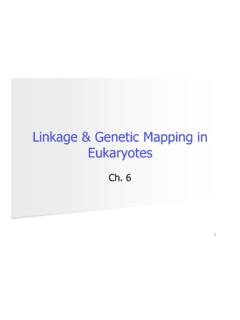Transcription of Medical genetic services in developing countries - …
1 Medical genetic services indeveloping countriesThe Ethical, Legal and Social Implications ofgenetic testing and screeningHuman GeneticsChronic Diseases and Health PromotionWorld Health Organization2006 Medical genetic services IN developing COUNTRIESIIWHO Library Cataloguing-in-Publication DataMedical genetic services in developing countries : the ethical, legal and social implications of genetic testing , Medical services issues rights Human 92 4 159344 X(LC/NLM Classification: QZ 50) World Health Organization 2006 All rights reserved. Publications of the World Health Organization can be obtained from WHO Press, World HealthOrganization, 20 Avenue Appia, 1211 Geneva 27, Switzerland (tel: +41 22 791 2476; fax: +41 22 791 4857; Requests for permission to reproduce or translate WHO publications whether for sale or fornoncommercial distribution should be addressed to WHO Press, at the above address (fax: +41 22 791 4806; designations employed and the presentation of the material in this publication do not imply the expression of anyopinion whatsoever on the part of the World Health Organization concerning the legal status of any country, territory,city or area or of its authorities, or concerning the delimitation of its frontiers or boundaries.))
2 This publication containsthe collective view of an international group of experts and does not necessarily represent the decision or the statedpolicy of the World Health mention of specific companies or of certain manufacturers products does not imply that they are endorsed orrecommended by the World Health Organization in preference to others of a similar nature that are not and omissions excepted, the names of proprietary products are distinguished by initial capital reasonable precautions have been taken by the World Health Organization to verify the information contained inthis publication. However, the published material is being distributed without warranty of any kind, either express orimplied. The responsibility for the interpretation and use of the material lies with the reader. In no event shall the WorldHealth Organization be liable for damages arising from its by WHO GraphicsPrinted in SwitzerlandiiiContentsAcknowledgementsvi Expert Review Panelviii1 Executive of of Medical genetics and genetic and of genetic diseases in the population andimpact on morbidity and tests and their genetic health applications of research and public : ethical, legal and social and and patient well-being.
3 Quality assurance and patient safety725 Conclusion, principles and genetic services IN developing COUNTRIESIV7 Glossary838 References909 Notes106 Appendix ADeveloping anddeveloped countries109 Appendix BDegrees of relationshipin consanguinity113 Appendix CFair process114 FiguresFigure 1 Normal human male karyotype7 Figure 2 Pedigrees illustrating different forms of monogenic inheritance10 BoxesBox 1 Deoxyribonucleic acid8 Box 2 Mendelian inheritance8 Box 3 Dispelling misconceptions21 Box 4 Grounds on which abortion is permitted percentage of countries43 Box 5 Recommendations for gaining informed consent for genetic testing59vMEDICAL genetic services IN developing COUNTRIESCase studiesCase study 1 Newborn screening in Brazil33 Case study 2 Ethical issues in Duchenne muscular dystrophy screening in India43 Case study 3 Social and ethical issues
4 Posed by thalassaemia in Sri Lanka61 Case study 4 Role of a patient support organization in sickle cell diseasediagnosis and treatment in Nigeria66 Case study 5 Student screening and public education in the Kingdom of Bahrain71 Country examplesCountry example 1 Cost-effectiveness analysis of fragile X screening in Israel35 Country example 2 Cost-effectiveness analysis of thalassaemia screening in Hong Kong SAR,China36 Country example 3 Cost-effectiveness analysis of family-based (cascade) screeningin Pakistan36 Country example 4 Community engagement in thalassaemia screening in theIslamic Republic of Iran46 Country example 5 Sex-selective abortions in India48 Country example 6 Sex-selective abortions in China50 Community example Dor Yeshorim as a response to the specific cultural needs of theAshkenazi Jewish population54 Country example 7 Patient rights in Georgia57 Country example 8 Scaling up genetic counselling capacity in Saudi Arabia63 Country example 9 Prenatal diagnosis regulation in India74 Country example 10 Commercial genetic testing services in Brazil76viThe present document grew out of a WHOC onsultation in April 2002, organized to respondto the recommendations of the AdvisoryCommittee on Health Research (ACHR) reporton Genomics and World Health (2002).
5 Theconsultation developed a strategy to promotegenetic services and to enhance global discussionon genetic ethics. Its recommendations emphasizedthe importance of an ELSI (ethical, legal and socialimplications) perspective in considering theimplications of genomics for health. HumanGenetics at WHO initiated a series of ELSI reportscovering different aspects of genetic services andtechnologies. The first report Genetics, genomicsand the patenting of DNA: review of potentialimplications for health in developing countries waspublished by WHO in 2005. This report is thesecond in the series. Human Genetics would liketo express its thanks to Monash University(Australia), for its support for this and other ethics-related initiatives of the report benefited from the input of numerousindividuals. Preparation of the document wasundertaken by Human Genetics, headed byVictor Boulyjenkov.
6 Angela Ballantyne hadprinciple responsibility for the report, includingresearch, writing, editing, and managing the reviewprocess. Imogen Goold and Amy Pearn providedassistance with aspects of this range of international experts contributedsignificantly to different sections of the of Medical Genetics and Geneticservices contributorsPatricia Aguilar-Martinez (University Hospitalof Montpellier), Victor Penchaszadeh (ColumbiaUniversity) and Mathew Taylor (University ofColorado) each wrote scientific backgroundpapers. Victor Penchaszadeh subsequently tookresponsibility for integrating these backgroundpapers and drafting the Primer of Medical Geneticsand genetic study contributorsOlu Akinyanju (Nigeria), Shaikha Al-Arrayed(Kingdom of Bahrian), Antonia Paula Marques-de-Faria (Brazil), Ishwar Verma (India) andDavid Weatherall (United Kingdom of GreatBritain and Northern Ireland/Sri Lanka) eachwrote background papers for the case studies inthe Capron (WHO/Ethics, Trade, HumanRights and Health Law ETH) provided usefuladvice at the initiation of the project.
7 The followingpeople provided advice on specific sections of thereport: Shelly Abdool (WHO/Gender, Womenand Heath GWH); Jane Cottingham (WHO/Gender, Reproductive Rights, Sexual Health andAdolescence GRR); Terry Hull (AustralianAcknowledgementsviiMEDICAL genetic services IN developing COUNTRIESN ational University); Eszter Kismodi (WHO/GRR); Bill Lavely (University of Washington);Brian Meyer (Saudi Arabia); Ainsley Newson(Imperial College London); Adepeju Olukoya(WHO/GWH); and Chen Reis (WHO/GWH).The programme would like to extend specialthanks to the Expert Review Panel who undertookthree rounds of review of the Dr Patricia Aguilar-Martinez (University Hospital of Montpellier, France)2. Dr Olu Akinyanju (Sickle Cell Foundation, Nigeria)3. Dr Shaikha Al-Arrayed (Salmaniya Medical Complex, Kingdom of Bahrain)4.
8 Dr Richard Ashcroft (Imperial College London, United Kingdom of Great Britain and NorthernIreland)5. Dr Alan Bittles (Edith Cowan University, Australia)6. Dr Nikolay Bochkov (Russian Academy of Medical Sciences, Russian Federation)7. Dr Dan Brock (Harvard Medical School, United States of America)8. Dr Wylie Burke (University of Washington, United States of America) Ruth Chadwick (Lancaster University, United Kingdom of Great Britain and NorthernIreland)10. Dr Arnold Christianson (University of the Witwatersrand, South Africa)11. Dr Androulla Eleftheriou (Thalassaemia International Federation, Cyprus)12. Dr Muin Khoury (Centers for Disease Control and Prevention, United States of America)13. Dr Bartha Knoppers (Universit de Montr al, Canada)14. Dr Florencia de la Luna (University of Buenos Aires, Argentina)15.
9 Dr Antonia Paula Marques-de-Faria (State University of Campinas, Brazil)16. Dr Victor Penchaszadeh (Columbia University, United States of America)17. Dr Mathew Taylor (University of Colorado, United States of America)Expert Review PanelixMEDICAL genetic services IN developing COUNTRIES18. Dr Ishwar Verma (Sir Ganga Ram Hospital, India)19. Dr Wanchai Wanachiwanawin (Bangkok University, Thailand)20. Sir David Weatherall (University of Oxford, United Kingdom of Great Britain and NorthernIreland)21. Dr Huanming Yang (Beijing Genomics Institute, People s Republic of China)x11 ExecutivesummaryThis report is the second in a series of reportsproduced by the Human Genetics at WHO toexamine the ethical, social and legal implications(ELSI) of genetics and genomics. It focusesspecifically on the ELSI of establishing medicalgenetic services in developing countries ,particularly those issues associated with genetictesting and screening.
10 This report draws from theincreasing body of empirical evidence regardingthe experience of developing countries inintroducing and expanding their Medical geneticservices. In order to provide an up-to-date pictureof the ethical issues currently associated withgenetic services in developing countries , the reportincludes five original case studies based onbackground papers commissioned specifically forthe report from geneticists working in developingcountries. The goal of this report is to broaden andenrich the discussion of some of the major ELSI specific to Medical genetic services in developingcountries, and to suggest principles of effectivemanagement of the ethical legal and social issuesraised by genetic testing and screening in report begins with a Primer of Medical geneticsand genetic services , which focuses on theimplementation of genetic services in developingcountries.

















